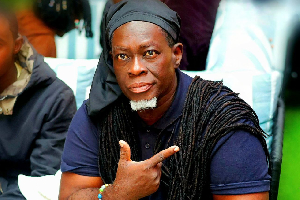Opinions of Tuesday, 11 September 2012
Columnist: Jehu-Appiah, Ali-Masmadi
NPP Manifesto on Agriculture is Bogus and Fraudulent!
Part One: Introduction
by Pan-Africanist International
‘For a thousand dollars, you could have had good government; for five thousand dollars, you can have any kind of government you want!’ - Russell Long on the effect of money in political campaigns.
Introduction
The NPP needs to clarify the nature of the agricultural mandate they plan to execute, if voted into power, as stated in their Manifesto for Election 2012, Chapter Three: Section 7. Modernizing Our Agriculture and Ensuring Food Security. Those of us who have been monitoring the NPP's not-so-clever fund-raising tactics, particularly, their dubious and clandestine relations with international corporations, were not in the least surprised to see what the NPP claims in its 2012 Manifesto, as their plans for Ghana's agriculture. It is nothing short of criminal. Is the NPP asking for the mandate of Ghanaians to introduce Genetically Modified seeds into our food chain? That is the question!
There will be the time and the place for a discussion of the laws surrounding political party financing by foreign corporations, the role of the International Democratic Union in what they call," fund-raising techniques", provide crucial examples, starting with the secret luncheon at Hotel Hyatt & Resorts, located on 24 M Streets, Nw, Washington, DC 20037 on Wednesday, June 4, 2008. [1] At that point, we would also have the occasion to discuss the negative impacts of all of these on the Ghanaian electorate; particularly, where influence-buying multinational corporations and a desperate candidate, make dangerous bed-fellows for our own safety.
There shall be the occasion to wonder as much as we can, on the impact of such policies on our health, the environment, our democracy, sovereignty, and destiny as a people. Even though these issues are central to the matter on hand, I wish to take a a step back, and discuss what the NPP is saying on Agriculture in their 2012 Manifesto, and to humbly call on every Ghanaian, irrespective of party political affiliation, to open their eyes widely, be informed and alert on the issues at stake in future of Ghana's agriculture sector. First of all, what are the principal issues at stake?
It is strange that Ghana, Tanzania and Ethiopia have been targeted by the G8 for the accelerated proliferation of GM crops, under the guise of ensuring food security, and the NPP Manifesto conveniently chooses not to speak to this issue. The NPP cleverly pays lip-service to the importance of agriculture, borrowing language from Monsanto and proceeds with the tacit endorsement of the AGRA programme. It is also instructive that the NPP retains AGRA in its Manifesto as an information resource, almost at par with the Ministry of Agriculture:
“Agriculture is considered to be an anchor of Ghana’s economy, and is estimated to creating value of approximately 14.2 billion dollars (roughly 23.9% of the 20141 GDP) and employs approximately, 4.6 million 56% of the workforce. However, the sector lacks sophistication and is dominated by subsistence farmers. Approximatively, three million small-holder farmers with average far sizes between 0,5-2 hectares currently produce 95% of the country's food crops. Further, as indicated by the Ministry of Agriculture and AGRA. Ghana faces increasing food security challenges in the near future. This is due to the pervasively fragmented value chain, inefficiency, and obsolete farming techniques and equipment in the sector." [2]
This is an apt description of what has long been referred to as "the white man's dream for Africa"! The following account in Voices From Africa: African Farmers & Environmentalists Speak Out Against a New Green Revolution in Africa, must explain why no pun is intended:
"The appointment of Kofi Annan as AGRA’s chairman was a strategic decision that the Gates Foundation made to silence criticisms that its agricultural development agenda was a “White Man’s Dream for Africa.” In fact, this reeks of Monsanto’s campaign: “Let the Harvest Begin.” Launched in 1998 to gain acceptance of GE crops around the world by projecting the benefits of the Green Revolution in Asia and its potential in Africa, Monsanto’s campaign managed to draw several respected African leaders, such as Nelson Mandela, to speak for a new Green Revolution in Africa. In response, all of the African delegates (except South Africa) to the UN Food and Agriculture Negotiations on the International Undertaking for Plant Genetic Resources in June 1998 issued a counter statement, “Let Nature’s Harvest Continue.” The delegates clearly stated their objection to multinational companies’ use of the image of the poor and hungry from African countries to push technology that is not safe, environmentally friendly, or economically beneficial." [3]
We ought to know by now that when G8 institutions and corporations promote Food Security in Africa, what they are really promoting is long term dependence and food insecurity. This means that what the NPP is presenting to us as their manifesto, is indeed a programme that really has its roots in "the White Man's dream for Africa". It is our purpose to challenge the NPP to come clean with the Ghanaian electorate. If the NPP seeks to distance itself from "the White man's dream for Africa" type of agriculture, they should do so very clearly. If on the other hand they do not see anything wrong with the introduction of Genetically Modified Organisms into our food chain, they must be honest enough and be forthcoming and open with the Ghanaian electorate.
It needs to be pointed out that there has been undue emphasis on agriculture as purely a commodity rather than on the multi-functionality of roles agriculture plays. Peter M. Rosset of Food First Institute, writes in "The Multiple Functions and Benefits of Small Farm Agriculture In the Context of Global Trade Negotiations":
"We must value the multiple functions of farms in the Third World if we are to achieve a sustainable agriculture, according to the Food and Agriculture Organization (FAO) of the United Nations (1999):
To face the current challenges of agriculture, we need to address agriculture and land in a broader context by integrating multiple roles (economic, food production, nature and land management, employment etc.). Sustainable agriculture and land use is not just a means to obtain more food and income in socially acceptable ways, which do not degrade the environment. Rather, it has an all-encompassing impact on communities, environments, and consumers.
We must reach a consensus and common understanding of sustainable land use as an opportunity to improve the quality of the environment, including its physical (increased soil fertility, better quality air and water), biological (healthier and more diverse animal, plant, and human populations), and social, economic and institutional (greater social equity, cohesion, peace/stability, well-being) components....
Land is not just a resource to be exploited, but a crucial vehicle for the achievement of improved socioeconomic, biological and physical environments. Concretely, by paying attention to the multiple functions of agriculture and land use, all economic, social and environmental functions of agriculture, at multiple levels, are recognized and included in decision making in order to promote synergies between these functions and to reconcile different stakeholder objectives." [4]
There are key policy options open to Ghanaians as a people, as to how do deal with issues in Food Sovereignty and Security. The issue of GM technology ought to have been a settled question by now, but its proponents never give up. They hide behind issues such as Climate Change, World Hunger, Poverty, etc. to make them have a social face, but their claims are as dubious as their intentions. It is therefore indispensable to expose the "poor washing" tactics on which they thrive. The pretension that we need to have genetically modified seeds in order to have a "modernized" agriculture is a retarded way of thinking which fails to take into account what scientists from various backgrounds have universally agreed upon, as we see in this BBC interview by Dr Michael Antoniou, a molecular geneticist, Kings College London (www.kcl.ac.uk):
"Indeed, the world has a moral obligation to feed itself. What is invariably ignored by advocates of GM crops in explaining why almost a billion of people in the world go to bed, each day, hungry, is that actually, we have more than enough food to feed everybody now. In fact, we have doubled the amount of food to feed everybody in the world now, but people don't have access to food. And in terms of meeting future food needs, specifically in the face of climate change, then the latest United Nations Food and Agriculture Organization sponsored report clearly pointed that the future in meeting future food needs lie in applying agro-ecological methods. They said that genetic engineering would play little or no role in meeting immediate food needs of the world and future food needs of the world. Which is why the Americans were not signatory. But 62 other nations, actually signed up, including the UK, signed up to that report. We have to take on board, the report compiled by 400 independent scientists from around the world, from all manner of expertise and disciplines, which said go forward with low-input, agro-ecological, sustainable agriculture, not GM, because GM simply does not fit the bill." [5]
The NPP writes in its Manifesto:
“Modernizing agriculture is fundamental to our programme of transformation and Ghana needs a breakthrough in agriculture to achieve self-sufficiency in in our food supply, particularly in grains, fish, and meat. Currently, we are only achieving 30% of our rice needs for example, while we have the potential to be 75% self-sufficient. Our farmers are significantly strained by a number of transversal interventions such as expensive and unavailable inputs, poor infrastructure, expensive financing, obsolete techniques and equipment and poor policy support. For example fertilizer usage in Ghana is only eight kilograms per hectare as compared to 20 kilograms per hectare in Asia. Less than 50% of farmers use fertilizers and when available, it is at high cost. Improved seeds are generally not available and are also at a high cost. Farm roads are bad and credit is too expensive when available.”
It is pathetic to see the NPP desperately trying to smuggle Genetically Modified seeds" into their manifesto, under the guise of "improved seeds". Why has the NPP not thought it fit to explain what they meant by "improved seeds"? Do Ghanaians not have a right to know whether or not a political party intends to introduce genetically modified seeds into Ghana's agriculture?
As a result of a self-serving contempt for the right of the consumer to know what is in the food they are eating, the Bio-technology industrial giants stand firmly opposed to all sorts of labellings which expose the food as being genetically modified to the final consumer. They argue that such a label is unnecessary because genetically modified foods are "substantial equivalents" of natural foods. It is not hard to understand their need to cover their tracks. People could easily link the physical disorders, diseases that these Frankenstein foods provoke! There are legal and financial liability reasons behind the stubborn refusal by the bio-technology industry to have their products labelled. It therefore came as no surprise, that the NPP was so nebulous about the type of seeds of high technology as simply "improved seeds" and the planned "Genetically Modified seeds" do not appear even once!
Ghana can easily produce enough to feed itself and more. The main agricultural productivity problem Ghana faces is not the kind of seeds it uses. The main problem is unfair competition and agricultural dumping. EPAs and aid put farmers out of business. You can't compete against free and make a living. Europe and the US provide food below the price of production. Ghana's production of chicken, rice, and tomatoes have been severely undercut and damaged by EPAs and aid.
Hunger in most cases is a result of poor distribution. What Ghana needs is greatly improved distribution systems so produce does not rot in the fields or spoil on the way to market. We need better roads, reliable public transportation, transportation assistance for farmers taking their products to market. We need speedy electronic up to the minute information systems for farmers identifying markets and demand, providing weather information, etc. These are already available with mobile phone technology. It has been repeatedly demonstrated through UN sponsored studies that the smaller the farm, the greater the yield. The main problem with feeding all the people is distributing the food. Providing and facilitating a distribution system is one crucial role of government.
What Ghana doesn't need are so called improved seeds that will cost farmers more and that cannot grow without expensive chemicals. That is the path to debt slavery. Improved seeds are "improved" by making them increasingly toxic to people, to animals, to the land and the water. They produce plants with barren seeds. Improved seeds are most successful at creating super weeds and super insect pests. That has been the documented experience of farmers in the US. Although corporate producers and NGOs brag about improved yields, most studies of "improved" seeds over time show smaller yields that get smaller over time. The supposedly improved rice seeds show smaller yields over time than traditional seeds.
Traditional seeds have been bred and honed over hundreds of generations to be perfectly adapted to the climate and conditions of the lands where they are grown. We need to encourage and enable farmers to save and work with Ghana's highly evolved traditional seeds. Besides, we need to bear in mind that the idea of “food as a weapon” is not new.
It makes no sense to assure our food security with foreign monopolization of our seeds, and a built-in dependence on these foreign corporations of dubious intentions and abilities. That is the definition of food insecurity. Food becomes a weapon. In 6 Ways Food is Being Used as a Weapon", we read the following words from Henry Kissinger:
“Hungry people will do anything for food, which means that those who have control over food can use it as leverage. In 1974, Henry Kissinger suggested using food as a weapon to induce targeted population reduction in a previously classified 200-page report, National Security Study Memorandum 200: Implications of Worldwide Population Growth for U.S. Security and Overseas Interests. The primary tactic to be applied is that food aid would be withheld from developing nations until they submitted to birth control policies:
There is also some established precedent for taking account of family planning performance in appraisal of assistance requirements by AID [U.S. Agency for International Development] and consultative groups. Since population growth is a major determinant of increases in food demand, allocation of scarce PL 480 resources should take account of what steps a country is taking in population control as well as food production. In these sensitive relations, however, it is important in style as well as substance to avoid the appearance of coercion.” [6]
This is why we need to be vigilant. Agriculture is to the life of our nation, in much the same way that oxygen is to our physical bodies. Agriculture is also a significant employer of more than half of the Ghanaian population, and sixty per cent of all women. An overwhelming majority of these farmers live on less than a dollar per day. It is imperative to demonstrate how the NPP hopes to better the lives of the poor farmers through their promise to "initiate programmes aimed at fostering the growth of a diversified agricultural sector, with efficient small holders as well as medium and large-scale producers. Accordingly, we will support a number of private sector change agents in large-scale commercial farming whilst assisting small-holders to adopt modern techniques and practices."
Which private “large-scale producers” is the NPP talking about engaging in their manifesto here? We would like the NPP to be honest enough to come out and inform Ghanaians clearly that they have decided to dabble in the GMO business, so that there could be a public debate. This is a decision of far-reaching consequences on the lives of all Ghanaians. It is normal and expected that in a democracy, a proper consent must be sought. The NPP has no right to interpret its mandate for the use of “improved seeds” as an authorisation by the people of Ghana to flood our markets with genetically modified foods. And no Ghanaian should be displaced from their land or have their farm livelihood destroyed because of large-scale farming by foreign corporations, which often promise jobs, but barely hire.
Like the poor cat in the adage, who wanted to catch the fish but did not want to wet its paws, the NPP wants a mandate to introduce Genetically Modified Organisms into our food chain, but they do not want a discussion! They do not even want the people to get the full picture, even less, to be informed! We are going to discuss this, whether they like it or not! And we are going to inform the good people of Ghana. There is something fundamentally flawed in the bid by the NPP to seek the mandate to assault our agriculture under false pretences. We want the NPP to come out to clearly explain that anomaly, or to formally rule out the introduction of GM crops under their administration. The people of Ghana need to know if a vote for the NPP is equal to a vote for GM crops. The NPP is being unfair to Ghanaians by asking them to vote NPP on the basis of promises to provide "improved seeds", a well known term commonly used to disguise and greenwash the fact that those seeds are genetically modified organisms that carry with them a myriad of dangers.
For Life, the Environment, and Social Justice!
Ali-Masmadi Jehu-Appiah,
(A Publication of the Situational Awareness Campaign, P-AI Ghana Solidarity Committee)
Pan-Africanist International - a grammar of Pan-Africanism and its manners of articulation.
www.panafricanistinternational.org/
References:
[1] The Enquirer: Akufo-Addo Busted In America | General News 2008-06-06 http://www.ghanaweb.com/GhanaHomePage/NewsArchive/artikel.php?ID=144931
[2] New Patriotic Party NPP Manifesto for Election 2012, Chapter Three: Section 7. Modernizing Our Agriculture and Ensuring Food Security: [Full Document]: NPP launches 2012 Manifesto | General News › 2012-08-29, www.ghanaweb.com. http://www.ghanaweb.com/GhanaHomePage/NewsArchive/artikel.php?ID=248958
[3] Voices From Africa: African Farmers & Environmentalists Speak Out Against a New Green Revolution in Africa | oaklandinstitute.org http://bit.ly/LEdRVw
[4] POLICY BRIEF N 4, The Multiple Functions and Benefits of Small Farm Agriculture In the Context of Global Trade Negotiations, By Peter M. Rosset, Ph.D., September 1999, [PDF] The Multiple Functions and Benefits of Small Farm Agriculture, www.foodfirst.org/files/pb4.pdf, 12-17 September 1999, Maastricht, The Netherlands.
[5] "The father of GM foods, bolivian seeds and wildebeest, Dr Roger Beachy, the father of GM foods on scientific ignorance and our moral obligations, Listen 28 minutes" http://www.bbc.co.uk/programmes/p00b2rgn. See also, for the transcript, Why Kofi Annan's "Green Wash" In Africa Does Not Wash! Feature Article of Sunday, 17 October 2010 by Mensah, Nana Akyea http://www.ghanaweb.com/GhanaHomePage/features/artikel.php?ID=195305
[6] 6 Ways Food is Being Used as a Weapon, By Activist Post, [Slightly edited by Rady Ananda] July 25, 2011 | http://foodfreedom.wordpress.com/2011/07/25/6-ways-food-is-being-used-as-a-weapon/














